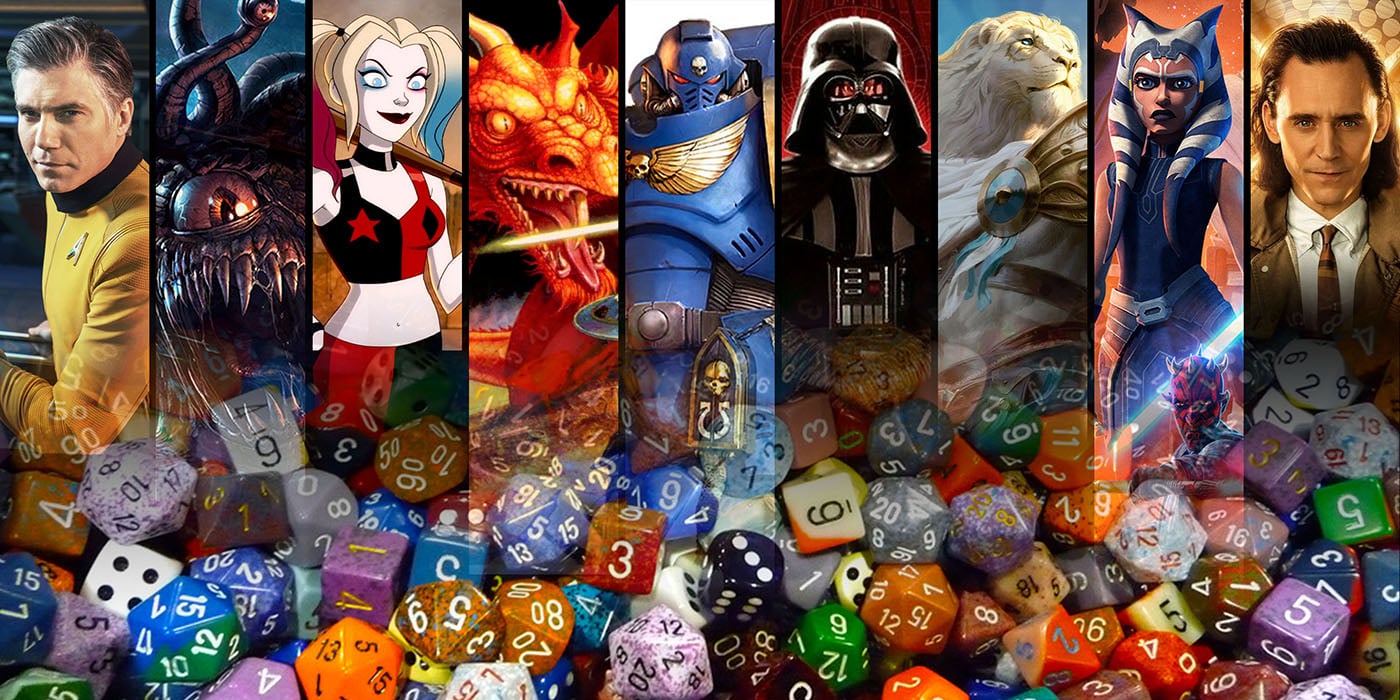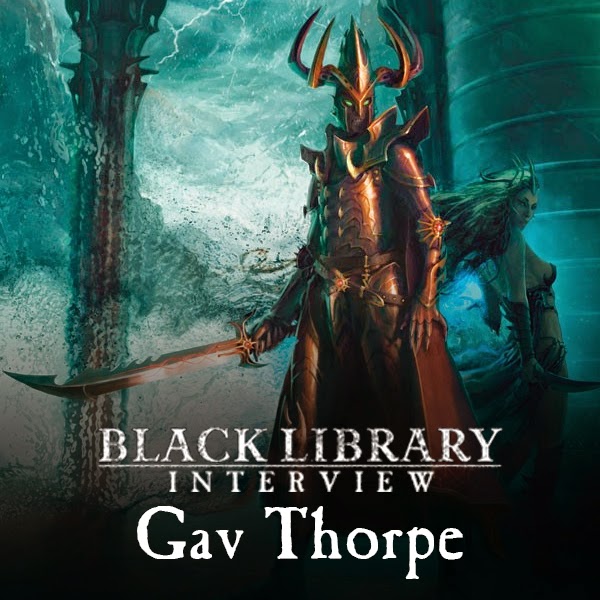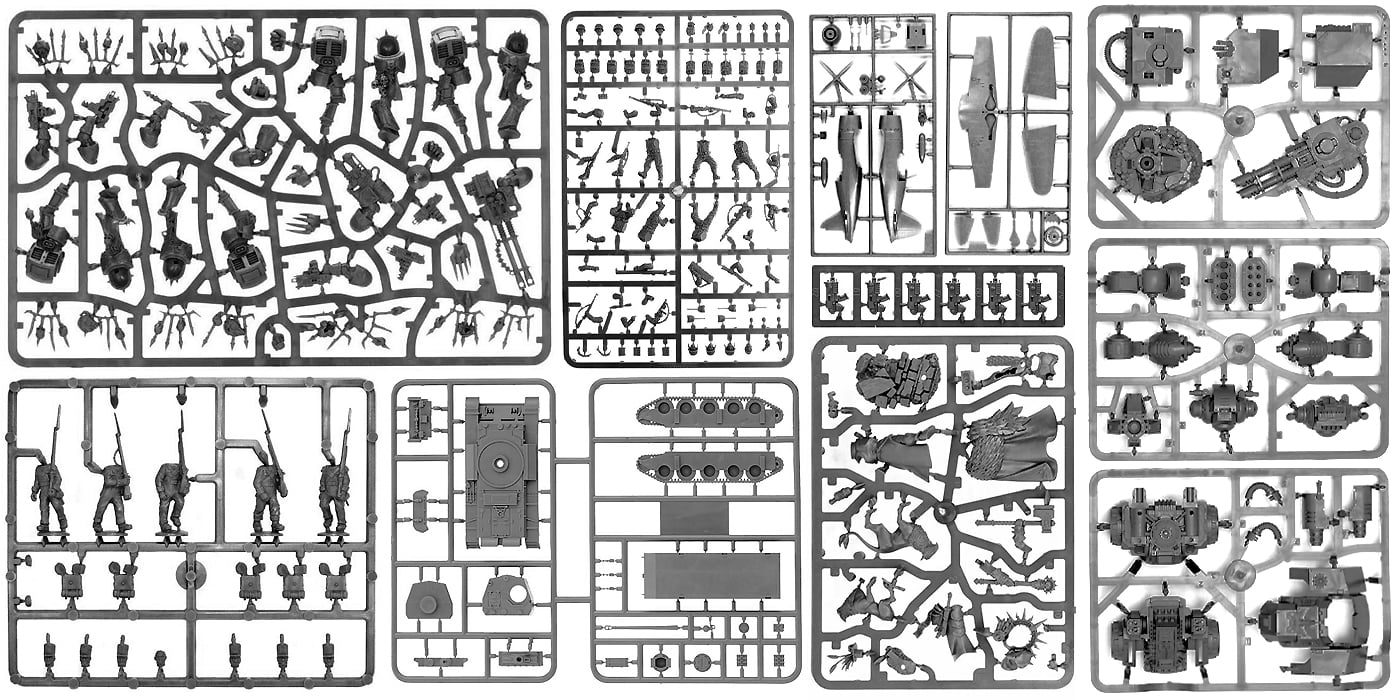INTERVIEW: Gav Thorpe


Today we have an in depth interview with one of the Black Library’s longest writing authors, Gav Thorpe.
Famous for secretive Space Marines, defiant Primarchs and Elves of the past and future, he shares with us what went into writing several of his novels. We also see his unique perspective on the End Times having worked on the Storm of Chaos campaign, a few tidbits about future Horus Heresy books and much more.
Gav: “I was there the day…” I was working at GW as an Assistant Games Developer when the Black Library imprint was started by a chap called Andy Jones. Andy was the creator of Warhammer Quest, which we assistants had spent three months playtesting with Andy, and our desks were about five metres away from each other.
Andy asked if I had thought about writing any fiction, as they were looking for stories for Inferno! magazine. I said I’d give it a go and wrote Birth of a Legend, and that’s how it all started.
Tyler: Can you explain the process that starts off a book? Do you approach BL with a completely new idea of your own, or do they give you the basic premise (for example, a book focusing on Imperial Fists) and let you come up with the rest?
Gav: It’s a mix of different things. Like most publishers, BL tend to work with series, be it trilogies or longer. The general scope of the series might come from them (“We’d like some more Dark Angels novels because a new codex is coming out”) or from me (“I really want to write about eldar”). It’s almost never more detailed than that at the earliest stage, and it’s up to me to flesh out the structure of the series and the individual stories within.
Occasionally there is a far tighter tie-in to the miniatures game product, such as the End Times books for Warhammer. In this situation, BL got a bunch of WH authors into a meeting room (and via Skype) and as a group we thrashed out potential stories, or divvied up who was going to write about what. It was then up to the individual authors to work out how the background material was going to be turned into a novel, which characters to focus on and so forth.
Gav: There’s never a single story that jumps out for these types of questions. I really enjoyed Shadow King and Doom of Dragonback was a real joy to write, but it’s also been great to get involved in the Horus Heresy series (which is also more rewarding in a far more practical fashion too!). I wouldn’t write a story if there wasn’t something I could get out of aside from being paid.
Tyler: What other Black Library novel, series or author inspires you most right now?
Gav: I really like Guy Haley’s writing, we’ve had many conversations about style over the years and are both aiming in generally the same direction with our prose. That he’s made goblins and orks properly horrific yet entertaining is an achievement.
Tyler: One thing I hear a lot is how important it is as an author to continually read other people’s works, what are you reading now and what are your all time favorite books? (from any genre)
Gav: I think that’s true when you are starting out, trying to find your own style and voice, looking for heroes and heroines to emulate. As you get more experienced and comfortable with your own writing it’s not so much of a thing. I mostly read non-fiction and graphic novels these days, but I’m trying to keep abreast of what’s happening in genre fiction as well. I’m currently reading all sorts of stuff, but highlights include Jen Williams’ The Copper Promise, which is a real treat of swords and sorcery-style fun. I’ve just put down Volume 4 of Saga, I have a couple of fantasy anthologies I got for Christmas, as well as William Miekle’s The Island of Terror.
Tyler: A lot of Black Library authors have a certain faction that they have kind of “adopted.” Your’s seem to be Dark Angels, Raven Guard and Elves. How much of this is your choice and how much of it was BL approaching you with more ideas for faction A after you wrote a successful book for them in the past?
Gav: It’s mostly just circumstance. I wrote Angels of Darkness because Graham McNeill was already writing about Ultramarines, Jim Swallow had Blood Angels and Bill King was dealing with Space Wolves – as well as finding them the most interesting of the big Chapters. The Sundering was something I wanted to write, but my natural affinity is more towards dwarfs than elves. As for the Raven Guard, that was a bit more deliberate, both because they were a Legion that hadn’t had a lot written about them and also because at the outset they are on the periphery of the big heresy stories so I could ease myself into the series without crashing into a bunch of existing characters and continuity. The only faction I’ve set out to champion in the Black Library is the eldar, which I am proud to say have become a successful subject for them to publish.
Tyler: Your Dark Angel books are some of my favorites, with Angels of Darkness considered a 40k classic by almost everyone. Can you talk a little about your choice to come back to those characters and storylines in the new Legacy of Caliban series?
Gav: Angels of Darkness was always meant to be a one-off book. Back in the early days I was keen to try out different ideas and different subjects (still am) and didn’t want to commit to another trilogy like the Last Chancers or an ongoing series like the Ultramarines or Gaunt’s Ghosts. The ending of the novel is poignant, deliberately ensuring those particular characters have completed their full narrative arc.
And then BL asked a few years later if I wanted to write a book for the Space Marine Battles series. It seemed an obvious choice for me to pick the war for Piscina IV which became the subject of The Purging of Kadillus. I had worked on the original campaign pack for GW and Boreas, protagonist of Angels of Darkness, came from that series of battles. It would be good to show him before he was isolated from his brothers, and I already knew how the campaign narrative functioned.
And that was meant to be it. A book and a sort-of prequel.
But then GW decided to include Dark Angels in the 40K starter set ‘Dark Vengeance’ and release a new codex, and it seemed insanity for BL not to have a new series of Dark Angels books to go with the inevitable surge of interest, and equally it would have been mad for me to turn down that opportunity. On top of that, by this point I was entrenched in the heresy side of things helping to smooth out the Dark Angels’ storyline in the 31st millennium and this was an unparalleled opportunity to create and present the Dark Angels’ story from two perspectives at the same time – the past and the ‘present’ of 40K.
Tyler: Speaking of Angels of Darkness, it was one of the first novels to really deal with the events surrounding the Horus Heresy. Were you given pretty much free reign with how you wanted to flesh out that backstory? How does it feel looking back on it now with the Heresy so fully fleshed out?
Gav: It was timely in a fashion, because I came up with the idea as GW were partnering with Sabertooth Games to create the Horus Heresy collectable card game. Alan Merrett was rationalising and expanding the existing lore, and through a discussion with him we hit upon the Old and New Legion dichotomy at the core of the Legions – that is, the split between legionnaires that originally hailed from Terra and elsewhere prior to the discovery of the Primarchs,and those from the Primarchs’ homeworlds that later were recruited into the legions. That gave me plenty of conflict I needed for Astelan’s story without delving too deeply into the rest of the events of the Heresy or definitively saying who stayed loyal or not.
The Horus Heresy provides us with an opportunity and a trap, and we have to tread carefully. It’s great to delve into the myths and mysteries of those days in more detail, but in doing so we shouldn’t destroy those myths and explain all of those mysteries. We’ve been trying hard to change some of the how and why of established events, shining new light on old lore, and part of that is to make sure that the story creates as many new threads and ideas as it consumes. With the Dark Angels I am trying hard to maintain the balance between setting out events as they happened and ensuring there is still plenty of room for personal interpretation (both of characters and readers) to decide how and why certain things happened the way they did. Just because we think we know what happened doesn’t mean everyone involved had such a god’s eye view.
Tyler: The Design Studio writes more about grand sweeping stories that encompass entire races, galaxies and pivotal turning point in the lore, whereas the Black Library focuses more on the personal side of things, obviously being very character driven. Having written for both ends of the spectrum, which do you prefer?
Gav: On the whole, I’ve always been drawn to character drama more than the space opera side of things. Warhammer and 40K are about these terrible places where individuals barely matter and yet they continue to strive to survive and make their lives relevant; where the darkness is so horrible even bloodthirsty tyrants can be lauded as heroes. For me, although the universes are about big battles, armies clashing, cities or planets dying in flames, Warhammer and 40K have still been about a personal narrative – that of the player, or the commander that represents them on the tabletop. That was the start of the whole idea – you can be that space marine captain or general of the empire.
History seems vast but is made up of much smaller stories binding together, creating direction and narrative out of the chaos of existence. Writing a 40K or Warhammer story is adding a strand to that encompassing turn of the universe, whether drawing in a squad of tactical marines or the entire craftworld of Alaitoc. The worlds exist to create stories as a writer or with toy soldiers, and I’ve always tried to make the background I’ve written subservient to that – events that are examples, inspirations, rather than definitive and enclosing.
Tyler: The rise of the audio drama is something that has been very prominent for Black Library the past few years. What were the difficulties of approaching writing for the spoken word as opposed to traditional books?
Gav: Not a difficulty as such, but there has to be an awareness of the strengths and weaknesses of the medium. It’s important to use the audio aspect to your advantage, using ambient and direct sound effects rather than narrative where possible, keeping description pithy, using dialogue where possible to convey thought rather than internal monologues. There are some limitations, like keeping the number of main characters down so that the voice acting budget doesn’t break, and remembering to keep scenes from growing too long and demanding extended focus from those actors.
Tyler: You recently contributed to the End Times series with the excellent The Curse of Khaine. How does it feel to finally be able to push the story forward so drastically and be a part of such a monumental part of the Warhammer world?
Gav: It’s great to be part of this huge event, but if I’m honest penning Curse of Khaine was probably the most difficult writing job I’ve ever had. There’s so much going on, it was impossible to fit everything into a single novel. Just as The Sundering should have been three more books in retrospect, just the elven arc of the End Times could have filled sic books. As it is, I had to choose a focus, and that was obviously Malekith, but there is a huge swathe of stuff going on ‘off-camera’ that I had to convey.
Tyler: You are in a rather unique position having written both the Sundering trilogy and the Curse of Khaine, which together pretty much encompass the entirety of Malekith’s story (so far). Does it lend a level of completeness to that character for you?
Gav: It does. I did wonder if Mr McNeill would get the gig, since he’s been writing about elves in the current timeline, but BL wanted me to tackle the elven story for just the reason you describe. We nicknamed Curse of Khaine as the fourth book of the Sundering, and I made the most of that, examining the cyclical, repetitive nature of history and elven cosmology as well as the cycles within Malekith’s own life. I’m not sure how much was deliberate on Mat Ward’s part and how much happy coincidence, but writing the Curse of Khaine and making links back to the Sundering with flashbacks brought home just how nicely the End Times dovetails with those events in the prehistory of the Warhammer world. It feels like a circle completed.
Tyler: Many people see the End Times as Storm of Chaos 2.0. Having been involved with both events, does it cast the End Times in a different light for you?
Gav: In some ways, resources most importantly, it is Storm of Chaos Done Right. I’ve not been party to the inside take of the whys and wherefores of the story itself, and I think the two events were aiming to achieve very different things although there is some common crossover in the stories – part of that being because the End Times is drawing on pretty much every miniature made in the last twenty years, including those for SoC. The main thing is that its even bigger than Storm of Chaos.
Gav: Sanguinius and the Blood Angels. I will write about them before the series is over, even if I have to hide bodies afterwards. Their story is at the heart of the themes of 40K, of nobility sacrificed, good intentions inverted, purity hidden beneath a shell of corruption. The opposite of the Dark Angels, really…
Tyler: Which setting inspires you more, 40k or Fantasy?
Gav: Both, in different ways. 40K is a huge canvas, Warhammer has a more defined space and timeline and so events and stories feel more relevant to each other.
Tyler: Any hints on future Horus Heresy or End Times books of yours you are able to give us?
Gav: I’m just starting Angels of Caliban, which unsurprisingly allows us to catch up with what’s been happening with Luther, Astelan, Zahariel and friends.
Tyler: Who would win in a fight, Malekith or Corax?
Tyler: Any final thoughts?
Gav: Thanks for reading and thanks for the questions. Happy gaming!
You can read more of Gav’s musings on all things Black Library and more at his blog, Mechanical Hamster.
What is your favorite book by Gav Thorpe?
Tyler is a life long painter and hobbyist and took home his first Golden Demon award at the 2012 Chicago Games Day with a follow up at the 2013 North American Games Day. More of his work can be found at his blog, Mengel Miniatures.



















